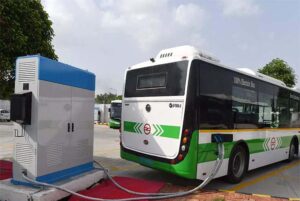Government of India has announced its plans to introduce a “payment security mechanism” to support the widespread adoption of electric buses in India, as stated by Tarun Kapoor, the Prime Minister’s advisor at the PMO.
 This move signals towards a significant shift towards eco-friendly public transport nationwide.
This move signals towards a significant shift towards eco-friendly public transport nationwide.
He stressed the importance of reducing the cost of electric vehicles (EVs) to accelerate their adoption.
While the government will continue to provide subsidies, Kapoor acknowledged that the focus should also be on reducing EV prices, as government subsidies cannot be sustained indefinitely.
He highlighted the urgency of strengthening battery manufacturing in India to decrease dependency on imports, particularly for lithium-ion batteries, where China currently leads.
To facilitate EV growth, the government is looking to involve the private sector more extensively in mineral exploration and production, including lithium, as evidenced by the Mines and Minerals (Regulation and Amendment) Bill recently passed in Parliament.
The introduction of the “payment security mechanism” aims to address challenges faced by financial companies in lending for EV projects.
Kapoor expressed confidence that this initiative, along with other planned measures, will enable the rollout of a large fleet of electric buses across the country.
